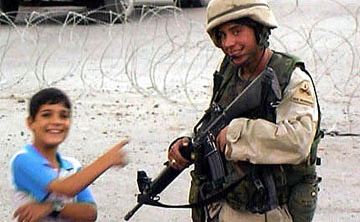

|
Gunner Palace
6 out of 10 |
 |
|
Rumsfeld and Rap The Iraqi Way Every morning the happy snappy radio chats on about how good things are in Iraq now, when it can be heard it in between the gunfire and the bomb blasts. Seeing how unrealistic the portrait of Iraq is painted, not only at home but on the ground in Iraq, American filmmaker Michael Turner realized the world had to know of those feeling forgotten in the front line. In 2003, Turner flew to Baghdad not suspecting that he would return to create a documentary about one of the most controversial subjects since Sept. 11. While making a film about a security company stationed in Iraq, he observed young US soldiers facing the growing insurgence of violence following the fall of Baghdad. Hoping to give them a voice, he began to film alongside the US 2/3 Field Artillery regiment stationed in the bombed out rubble of Uday Hussein's palace in Karada, renamed Gunner's Palace by the troops. As Turner recorded the daily experiences and thoughts of the young men and women serving far away from home, he captures some of the difficult questions, poignant moments and experiences of those called to serve in wartime. A documentary that has been acclaimed for taking a balanced approach to it's subject. Without judgment, Turner attempts to gives a real sense of the environment in which the US soldiers live and work, from the hot cloudless days, dusty streets filled with intermittent gun fire or the rubble of the Palace, it gives a fly on the wall look at the day to day lives and duties of the solders. Although less obviously, Turner also broaches some of the problems facing the region following the collapse of leadership and concerns of the people who the army will leave behind. He attempts to capture both those traumatized by war, filming under the silent gaze of the women in raided houses and a more empowering view of people assisted by the solders who are attempting to protect and help the Iraqi's rebuild in the face of tremendous odds. The strongest aspect of the documentary and the most compelling, in allowing the soldiers to speak for themselves, Tucker breaks a stereotype of the American soldier who is often portrayed as not capable of empathy or compassion. The solders of the 2/3 Field Army regiment come across in the picture as well-educated, exhibiting healthy skepticism about war and balanced reasons as to why they have chosen to join the army. Takes care not to over glamorize the army, many seem more worldly than generations sent to fight in Desert Storm or Vietnam, taking a very humanitarian and mature view of their situation. Even in times of fear, while sent on night raids, to restore order or to defuse a bomb, they are still quick to point out that no one can justify war. Although at times simplistic, and not as confrontational as "Fahrenheit 9/11" or "Control Room" with a bit more direction or focus, Tucker who was in the right place at the right time, neglects the views of the Iraqi and avoids asking some tougher questions. Still, capturing the innocence and thoughts of those involved in such dangerous circumstances and keeping the eyes of America on those still in danger in Iraq, "Gunner Palace" will inspire conversations and concern at home. Upon returning home to Berlin, Tucker's own views changed about Baghdad following the deaths of members of the regiment. Unlike a film, war has no end and the reason behind attempting to preserve their memories becomes clear as one of the young soldiers claim "to y'all this is just a show, but we live in this movie." Film Critic: Jennifer M Lillies |
|